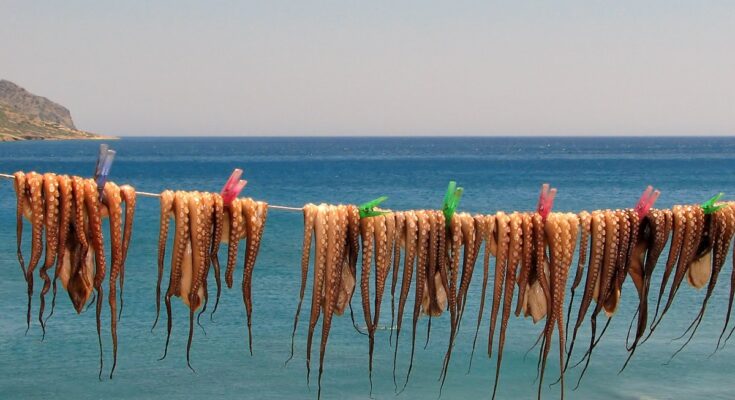The sight of octopuses hanging out in the sun is a common feature on all Greek islands during the summer.
As you walk down a narrow, whitewashed street lined with traditional tavernas, you can’t help but notice the intriguing sight of octopuses drying in the sun. Their elongated forms, set against the vibrant blue sky, sway gently in the breeze. This captivating scene is both genuine and fascinating, showcasing a culinary tradition that has endured for centuries.
The most common recipe for octopus in fish taverns is the grilled version, according to which the octopus, which is often fresh, is grilled over charcoal and seasoned with fresh lemon. However, grilling alone isn’t sufficient; octopus demands specific prepping to achieve tenderness and optimal grilling outcomes.
Fishermen start by trapping the octopus and then killing it by cutting a nerve between its eyes. Subsequently, the octopus is beaten against a rock—up to a hundred times—to expel water.
This procedure is essential in order for the meat to be tender when grilled. If the octopus is grilled directly with its water, it will steam it into a rubbery mass.
Greek procedure for octopuses
Usually, the fishermen hang their catch first thing in the morning and do not take it down until the evening. This is part of the traditional method for preparing and preserving them.
This process, rooted in centuries-old practices, is tenderizing the flesh. Freshly caught octopus can be quite tough, and the sun-drying process helps break down the muscle fibers, making the octopus more palatable and easier to chew.
It also helps in the preservation of the octopus. Sun-drying reduces the moisture content in the octopus, which helps preserve it for longer periods. This method was especially important before the advent of modern refrigeration, as it allowed people to store seafood without it spoiling quickly.
Food experts point pout that the drying process intensifies the flavor of the octopus. As the water content decreases, the natural flavors become more concentrated, resulting in a richer taste.
This traditional practice is not just a culinary technique but also a cultural one, reflecting the deep connection between the Greek people and the sea. It showcases their resourcefulness and their ability to make the most of their natural environment.
From a naturalistic perspective, the process of sun-drying food using sustainable methods can be seen as environmentally friendly and aligned with traditional, non-industrial food preservation techniques.
While it might not fit conventional definitions of beauty, the practice has its own unique aesthetic that tells a story of cultural continuity and practical ingenuity.

Is it moral to eat octopus?
Acclaimed filmmaker Alexander Payne sparked a heated debate in Greece after recently pronouncing the killing and consumption of octopus to be immoral.
The Greek-American director said during an interview with the Greek daily Kathimerini:
“There is something I do not understand about the Greeks. How can they eat octopuses?”
He added: “They taste fantastic, but they are some of nature’s most charismatic creatures, with intelligence and grace. So, I do not care where you go for food, as long as the menu does not have an octopus.”
Several animal rights activists and social commentators took to social media in support of Payne, highlighting the fact that octopuses, which have blue blood, three hearts, and a doughnut-shaped brain, possess remarkable intelligence.
Greek recipes for octopus
Once the octopus is properly tenderized, it can then be used in your recipe of choice.
Common methods for preparing it include grilling it or braising it. Frying octopus is very rare and Greeks find that they prefer this seafood when it is tenderized properly and then prepared simply to enhance its natural flavors. Here are some common recipes that enhance the natural flavors of the octopus:
- Octopus With Ouzo
- Wine Braised Octopus
- Octopus Salad (Oktopodi Salata)
- Grilled Octopus
- Octopus With Garlic Sauce
- As you can see, there are a lot of ways to prepare octopus in Greek cuisine.
Ancient Greeks loved octopuses
The octopus was a favorite food of the ancients. It was admired for its sweet taste and was additionally thought to be an aphrodisiac.
Derived from the Greek/Latin words OCTO – eight and PUS – feet, the word originates in the renaissance. First recorded by French Naturalist Gullaume Rodelet in 1554 as Polypus Octopus. And then formalized by Carl Linnaues in 1735. Before this, the name was generally the Polypus (many feet).
Many vessels from the Minoan culture which flourished from 2700 BC -1500 BC and Mycenean times between 2000 BC and 1100 BC depict octopuses.
Octopus vases have led some thinkers into believing that Minoans worshipped the sea and the creatures therein. Other scholars have conjectured that the ancient Cretans looked to octopus tentacles as inspiration for that characteristic Minoan architectural conceit, the labyrinth.
As a post in the blog ferrebeekeeper notes, the real symbolic or ritual purpose of the octopus motif remains unclear and probably always will. What is certain is that the vases, drinking vessels, and jars are quite lovely.
The octopus motif originated around 1500 BC and by the Minoan period the so-called “marine style” of decorating pottery had become even more prevalent and diverse. Some ceramics were covered with fish, octopuses, dolphins, and crabs. In fact, there was even a vessel covered with murexes.
Related: Greek Octopus Recipe for a Delicious ‘Sarakosti’



